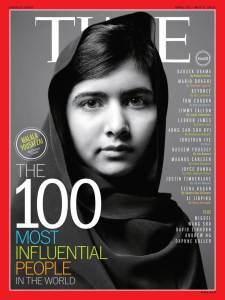
Malala Yousafzai on the cover of TIME Magazine, after being nominated as one of the 100 most influential people of 2014. Photo taken from time.com.
Think back to 2012…remember Malala Yousafzai? Remember when she was shot by the Taliban and was not expected to live? Yousafzai lived, and she has achieved a great deal of success since then.
It was Oct. 6, 2012 when Yousafzai was returning home on her school bus, and a gunman from the Taliban entered the school bus and shot her close range, hitting the side of her head. She had known of a death threat placed upon her for years because of her advocacy in girls’ rights and education. The bullet then traveled down her neck, forcing her body to be in critical condition.
In hopes of keeping Yousafzai alive, she was sent to two different hospitals, and had a portion of her skull surgically removed in order to stop her brain from swelling. She received multiple surgeries to help her recover and she was placed under a medically induced coma.
Less than a year later, Yousafzai began to attend school in Birmingham, Alabama. Soon after, she delivered a speech to the United Nations and published a biographical novel about her journey entitled I Am Malala: The Girl Who Stood up for Education and Was Shot by the Taliban. Yousafzai was almost named as one of TIME’s most influential people last year.
Since then, she has continued her mission in standing up for girls’ education rights. The Nobel Peace Prize committee acknowledged her hard work and dedication to this cause when they awarded Yousafzai and Kailash Satyarthi, a children’s rights activist in India, the Nobel Peace Prize just a few weeks ago in October.
This made Yousafzai the youngest candidate and the youngest winner of the prize. She was in school when she was given the incredible news, but she continued her school day before she reacted to the news publically.
The Nobel committee explained that one of the reasons why Yousafzai and Satyarthi were this year’s recipients of the prize was their “struggle against the suppression of children and young people.” Malala dedicated her award to “all those children who are voiceless and whose voices need to be heard.”
Winning the award gave Yousafzai a tremendous amount of confidence and motivation to keep advocating for girls’ rights and education: “I felt more powerful and more courageous because this award is not just a piece of metal or a medal you wear or an award you keep in your room. This is encouragement for me to go forward.”
The Nobel Peace Prize committee also explained, regarding Yousafzai, “Despite her youth, Malala Yousafzai has already fought for several years for the right of girls to education, and has shown by example that children and young people, too, can contribute to improving their own situations.“This she has done under the most dangerous circumstances. Through her heroic struggle she has become a leading spokesperson for girls’ rights to education.”
The dynamic duo, Yousafzai and Satyarthi, were given the peace prize and $1.1 million by the chairman of the Nobel committee. The Yemeni Nobel peace laureate stated that Yousafzai and Satyarthi were highly worthy of the award because they continuously work toward ending the “outstanding and long struggle for the rights of the child.”
Students at York Suburban High School who have heard this great news have taken it to heart and have been inspired by the heroic work of Yousafzai. Senior, Alessandra Greco, responded to the article and stated that Yousafzai “winning the Nobel Peace Prize at such a young age makes me feel as though our generation can be inspired to stand up for what we believe in, and have confidence that we can make a difference.”